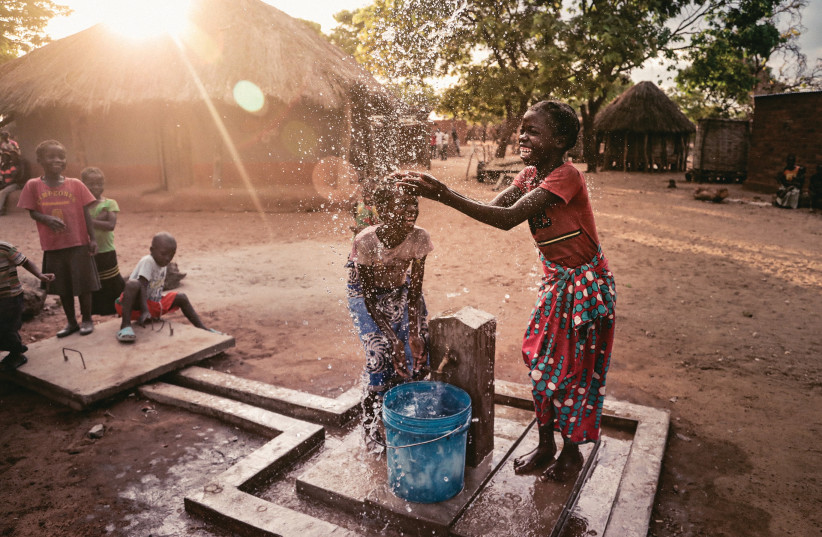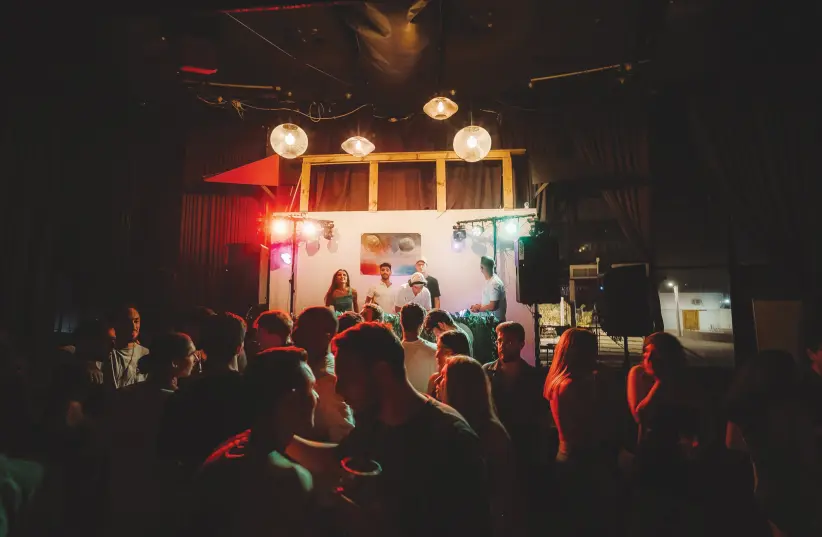Gin and tonics, DJs, thumping music and… clean water projects?
It’s not the usual combination for those aiming to party heartily. But for Marcel Amarilio, Nathaniel Mayberg and Or Sahar, three 20-something friends in the lively Tel Aviv party scene, bringing water to Africa is as important as the brand of vodka they serve at the parties they’ve been throwing for the past year.
The friends met up North four years ago on a social trip with other students from IDC Herzliya’s Reichman University. Then in 2021, they began throwing parties in Tel Aviv, famed as the hub of the country’s party scene.
“We’d been doing parties the whole year,” said Marcel. “I thought, let’s make a big party and help communities in Africa”
“We’d been doing parties the whole year. I thought, let’s make a big party and help communities in Africa.”
Marcel Amarilio
Mayberg added, “It was a sneaky way to get people to do charity. It became this all-around entrepreneurial project, being funded by people partying.”
Creating water from thin air with Israel’s Watergen
For Amarilio, the partying wasn’t enough. As part of his venture capital work, the budding entrepreneur had traveled to his native Athens for Calcalist’s Israel-Greece Conference this past May 31-June 1, where he learned about a company called Watergen. And while Amarilio and his friends aren’t working directly with the company, it served as inspiration.

Watergen is a pioneering Israeli company that uses the humidity in the air to create clean and fresh drinking water. The technology – potentially lifesaving in addressing water scarcity for rural and remote villages – has been utilized in countries such as India, Costa Rica and Sierra Leone.
While the standard water distribution process requires a well, Watergen uses atmospheric water generation, providing a water tank in places where a physical well is not feasible.
It literally creates water out of thin air. “Yaish m’ayin,” something from nothing, as we would say in Israel.
The two-day program Amarilio attended was designed to create connections between the Israeli business community and those abroad.
The presentation did exactly that.
Amarilio was intrigued to learn about clean water efforts and the technology involved, especially as a resident of Israel, which is no stranger to limited natural water resources.
Clean water party
Less than a month later, Amarilio and his friends hosted “Help and Dance” in Tel Aviv in a hot club overlooking the Tel Aviv Marina. They succeeded in packing the room and selling more than 350 tickets, raising approximately $4,000 in what they billed a “clean water party.”
SAHAR WAS an integral part of quickly arranging the venue and operations.
“For me it was very exciting to do something that wasn’t for profit, that we weren’t trying to exchange entertainment for revenue,” he said.
This was at a point in his life when he was tired of the exclusivity at parties and clubs, and so he decided to make a party of his own.
“It was an exhausting 48 hours of ongoing movement,” Sahar explained. “But it felt like a very big achievement. People definitely appreciated what we were doing, which is why they paid the ticket price.”
Amarilio has completed an internship with Hafla Ventures, which aims to bridge the gap and create business opportunities between the Israeli tech ecosystem and the MENA (Middle East & North Africa) region. He and the company are considering future collaborations.
Mayberg is a former enterprise risk specialist at Parametrix Insurance, which helps companies identify and mitigate risks in their cloud infrastructure. He recently started a financial technology company called OlehPay, offering remittance services to Americans wiring money to Israel at competitive rates. Mayberg immigrated to Israel in 2015.
Sahar, a native Israeli whose army service involved working on software for the Iron Dome missile-defense system, is a senior backend developer at Tel Aviv-based Guesty, an Internet publishing business.
“I work in a hi-tech company because I need to have a job,” he said. “But that’s not who I am. It doesn’t define my personality. I can afford a nice lifestyle. I came to this initiative because I felt a bit of emptiness from having fun and going to parties and getting drunk.
The three friends, all starting vibrant careers, see their work on the parties not only as a hobby, but also a calling.
Said Mayberg, “This is just for fun, a passion project. We’re just trying to actually do something.”
Sahar commented, “I was lucky to meet Nathaniel and Marcel. We became a good crew that can actually make things happen.”
Enter Innovation: Africa
Amarilio looked at his friends’ skill sets and pushed them to build an initiative that would make an impact. While intrigued by Watergen’s mission, they continued to explore organizations committed to water solutions in Africa.
Mayberg knew about Innovation: Africa, an NGO that brings Israeli solar, water and agricultural innovations to rural African villages through philanthropic work with his family’s Mayberg Foundation. Having observed their work firsthand, he knew that partnering with them could make an impact.
INNOVATION: AFRICA installs solar energy systems to provide lights for schools and medical centers. Crucially, however, it also brings clean water to entire African villages by constructing solar-powered water-pumping systems, drilling into aquifers just meters beneath the ground and pumping clean water to the inhabitants.
Amarilio said, “I see it as a true passion of mine to get involved in working for a start-up or down the line making my own in the field of sustainability, energy storage, renewable materials etc.”
Vetting organizations for the clean water party, along with his schoolwork, have helped crystalize Amarilio’s goals.
“This is my passion and interest in life, as these companies will make a difference in the world,” he explained.
Mayberg said, “I give 10% of my salary [to charity] every month. I like that mitzvah. I think most of our peer groups don’t [participate in that mitzvah]. Part of the problem is that organizations are not good at raising money. Part of our mission is to be a connector of people our age.”
Mayberg attended what is now the Katz Yeshiva High School, a Modern Orthodox yeshiva in Boca Raton, Florida, before moving to Israel for college. Once here, he began leading Jewish programming in Herzliya, managing relationships with donors to fund events.
“We’re very involved Jews,” said Amarilio, who grew up in Athens. “My mother is the secretary general of the Jewish community. We’re Jews to our core.
“We got to give back to the community that for all these years had been taking care of us as kids in a similar manner,” he said, reflecting on his time as a counselor at the Athens Jewish Day Camp.
Marcel, Nathaniel and Or know that not everyone will support their universalist efforts.
“Whenever you try to do anything you get haters,” said Mayberg. “You get pushback as to why you aren’t doing something in Israel. I think it’s a valid point. We started discussing yesterday potentially doing a project or two a year, one in Israel or outside.”
The friends have thoughts about scaling up their project in order to exponentially increase their impact. We can see the project as replicable in other cities, such as New York.
“It can be a global movement and this is just the start,” said Mayberg.
In partnership with Innovation Africa, the friends have donated approximately $4,000 to a village in Zambia, where thousands of villagers are reliant on open, contaminated water sources. The organization has completed more than 720 solar and water installations, impacting some 3.6 million people across 10 African countries.
Having successfully funded their first project, the group is excited to begin engaging in peer-to-peer fundraising to secure additional funds toward a water project, which will cost about $65,000. This includes a crowdfunding platform as well as individual solicitation.
Young Jews in their 20s are a hard-to-reach demographic, and the friends’ hope their success will inspire large donors to match funds.
“We were thinking of where we can make an impact, where we can effect change,” said Mayberg. “You don’t have to be wealthy to make an impact. Every dollar donated can and does make a difference.”
